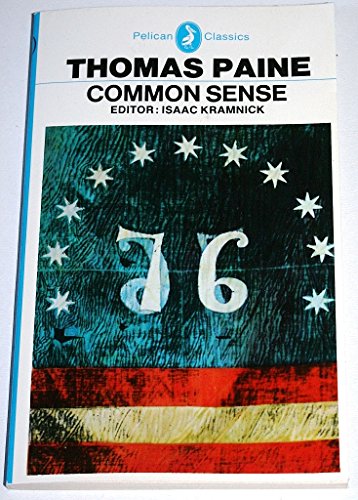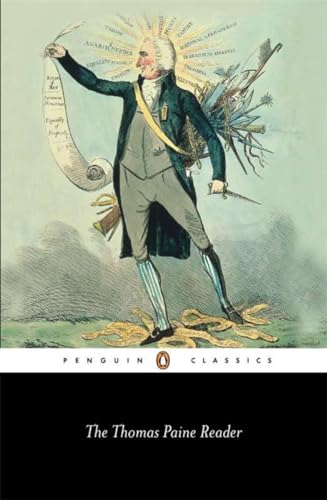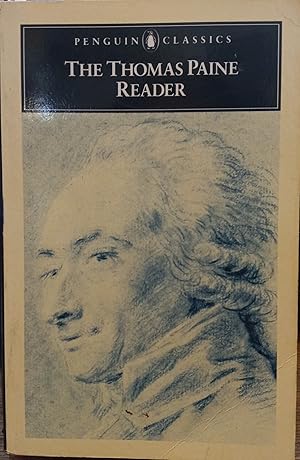Thomas Paine Isaac Kramnick Editor (10 results)
Search filters
Product Type
- All Product Types
- Books (10)
- Magazines & Periodicals (No further results match this refinement)
- Comics (No further results match this refinement)
- Sheet Music (No further results match this refinement)
- Art, Prints & Posters (No further results match this refinement)
- Photographs (No further results match this refinement)
- Maps (No further results match this refinement)
- Manuscripts & Paper Collectibles (No further results match this refinement)
Condition Learn more
- New (No further results match this refinement)
- As New, Fine or Near Fine (1)
- Very Good or Good (6)
- Fair or Poor (3)
- As Described (No further results match this refinement)
Binding
- All Bindings
- Hardcover (No further results match this refinement)
- Softcover (10)
Collectible Attributes
- First Edition (No further results match this refinement)
- Signed (No further results match this refinement)
- Dust Jacket (No further results match this refinement)
- Seller-Supplied Images (1)
- Not Print on Demand (10)
Language (1)
Price
- Any Price
- Under US$ 25
- US$ 25 to US$ 50 (No further results match this refinement)
- Over US$ 50 (No further results match this refinement)
Free Shipping
Seller Location
Seller Rating
-
Paperback. Condition: Fair.
-
Paperback. Condition: Fair.
-
Common Sense (Penguin Books for Political Science)
Seller: Your Online Bookstore, Houston, TX, U.S.A.
Paperback. Condition: Fair.
-
Paperback. Condition: Good.
-
Paperback. Condition: Good. No Jacket. Former library book; Pages can have notes/highlighting. Spine may show signs of wear. ~ ThriftBooks: Read More, Spend Less.
-
Paperback. Condition: Good. No Jacket. Pages can have notes/highlighting. Spine may show signs of wear. ~ ThriftBooks: Read More, Spend Less.
-
Common Sense
Published by Penguin Group, London, England, 1982
ISBN 10: 0140390162 ISBN 13: 9780140390162
Language: English
Seller: Nelsons Books, Chazy, NY, U.S.A.
Trade paperback. Condition: Very good. Revised ed. Trade paperback (US). Glued binding. 128 p. Audience: General/trade.
-
The Thomas Paine Reader Format: Paperback
Published by Penguin Random House, 1987
ISBN 10: 0140444963 ISBN 13: 9780140444964
Language: English
Seller: INDOO, Avenel, NJ, U.S.A.
Condition: As New. Unread copy in mint condition.
-
Thomas Paine Reader
Seller: The Book House, Inc. - St. Louis, St. Louis, MO, U.S.A.
Trade Paperback. Condition: Good. Good 1987 paperback, some underlining/highlighting.
-
Common Sense
Published by Penguin Classics, New York, 1986
ISBN 10: 0140390162 ISBN 13: 9780140390162
Language: English
Seller: Ground Zero Books, Ltd., Silver Spring, MD, U.S.A.
Mass market paperback. Condition: Good. Later printing. 128 pages. Editor's Introduction, Notes. to the Editor's Introduction. Notes on the Text. Suggestions for Further Reading Tabular data. Appendix. Sticker residue on the front cover. There is some general wear and tear along with a one inch rip at the top left of the front cover. Published anonymously in 1776, the year of the American Declaration of Independence, Paine's Common Sense became an immediate bestseller, with fifty-six editions printed in that year alone. It was this pamphlet, more than any other factor, which helped to spark off the movement that established the independence of the United States. From his experience of revolutionary politics, Paine drew those principles of fundamental human rights which, he felt, must stand no matter what excesses are committed to obtain them, and which he later formulated in his Rights of Man. Thomas Paine (born Thomas Pain; February 9, 1737 [O.S. January 29, 1736] June 8, 1809) was an English-born American Founding Father, French Revolutionary, inventor, and political philosopher. He authored Common Sense (1776) and The American Crisis (17761783), two of the most influential pamphlets at the start of the American Revolution, and he helped to inspire the colonial era patriots in 1776 to declare independence from Great Britain. His ideas reflected Enlightenment-era ideals of human rights. Isaac Kramnick (March 6, 1938 December 21, 2019) was a political theorist, historian of political thought, political scientist, and the Richard J. Schwartz Professor of Government at Cornell University. Common Sense is a pamphlet written by Thomas Paine. It was first published anonymously on January 10, 1776, during the American Revolution. Paine wrote it with editorial feedback from Benjamin Rush, who came up with the title. The document denounced British rule and, through its immense popularity, contributed to stimulating the American Revolution. The second edition was published soon thereafter. A third edition, with an accounting of the worth of the British navy, an expanded appendix, and a response to criticism by the Quakers, was published on February 14, 1776. Paine's original title for the pamphlet was Plain Truth, but Paine's friend, pro-independence advocate Benjamin Rush, suggested Common Sense instead. Finding a printer who was daring enough to commit his print shop to the printing of Common Sense was not easy. At the advice of Rush, Paine commissioned Robert Bell to print his work. The pamphlet came into circulation in January 1776, after the Revolution had started. It was passed around and often read aloud in taverns, contributing significantly to spreading the idea of republicanism, bolstering enthusiasm for separation from Britain, and encouraging recruitment for the Continental Army. Paine provided a new and convincing argument for independence by advocating a complete break with history. Common Sense is oriented to the future in a way that compels the reader to make an immediate choice. It offers a solution for Americans disgusted with and alarmed at the threat of tyranny. Paine's attack on monarchy in Common Sense was essentially an attack on King George III. Whereas colonial resentments were originally directed primarily against the king's ministers and Parliament, Paine laid the responsibility firmly at the king's door. Common Sense was the most widely read pamphlet of the American Revolution. It was a clarion call for unity against the corrupt British court, so as to realize America's providential role in providing an asylum for liberty. Written in a direct and lively style, it denounced the decaying despotisms of Europe and pilloried hereditary monarchy as an absurdity. At a time when many still hoped for reconciliation with Britain, Common Sense demonstrated to many the inevitability of separation. Paine was not on the whole expressing original ideas in Common Sense, but rather employing rhetoric as a means to arouse resentment of the Crown. To achieve these ends, he pioneered a style of political writing suited to the democratic society he envisioned, with Common Sense serving as a primary example. Part of Paine's work was to render complex ideas intelligible to average readers of the day, with clear, concise writing unlike the formal, learned style favored by many of Paine's contemporaries. Scholars have put forward various explanations to account for its success, including the historic moment, Paine's easy-to-understand style, his democratic ethos, and his use of psychology and ideology. Common Sense was immensely popular in disseminating to a very wide audience ideas that were already in common use among the elite who comprised Congress and the leadership cadre of the emerging nation, who rarely cited Paine's arguments in their public calls for independence. Paine used "common sense" as a weapon to de-legitimize the monarchy and overturn prevailing conventional wisdom. Rosenfeld concludes that the phenomenal appeal of his pamphlet resulted from his synthesis of popular and elite elements in the independence movement. Paine also denounced aristocracy, which together with monarchy were "two ancient tyrannies." They violated the laws of nature, human reason, and the "universal order of things," which began with God. That was, Middlekauff says, exactly what most Americans wanted to hear. He calls the Revolutionary generation "the children of the twice-born". because in their childhood they had experienced the Great Awakening, which, for the first time, had tied Americans together, transcending denominational and ethnic boundaries and giving them a sense of patriotism.





